二十四节气 英文版
- 格式:ppt
- 大小:3.08 MB
- 文档页数:26
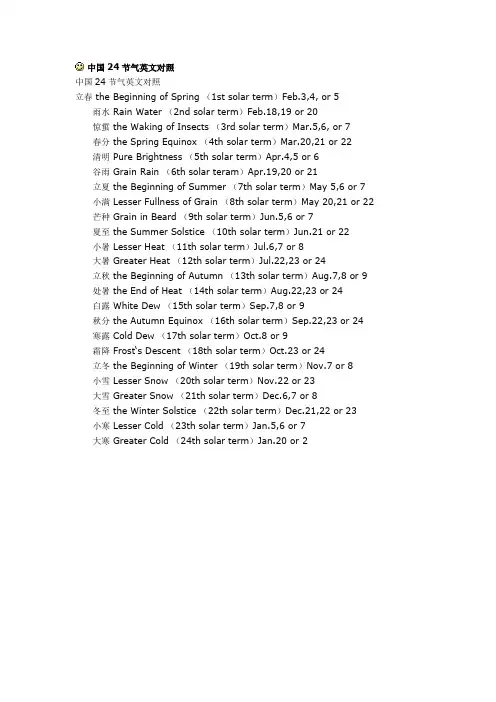
中国24节气英文对照中国24节气英文对照立春 the Beginning of Spring (1st solar term)Feb.3,4, or 5 雨水 Rain Water (2nd solar term)Feb.18,19 or 20惊蜇 the Waking of Insects (3rd solar term)Mar.5,6, or 7春分 the Spring Equinox (4th solar term)Mar.20,21 or 22清明 Pure Brightness (5th solar term)Apr.4,5 or 6谷雨 Grain Rain (6th solar teram)Apr.19,20 or 21立夏 the Beginning of Summer (7th solar term)May 5,6 or 7 小满 Lesser Fullness of Grain (8th solar term)May 20,21 or 22 芒种 Grain in Beard (9th solar term)Jun.5,6 or 7夏至 the Summer Solstice (10th solar term)Jun.21 or 22小暑 Lesser Heat (11th solar term)Jul.6,7 or 8大暑 Greater Heat (12th solar term)Jul.22,23 or 24立秋 the Beginning of Autumn (13th solar term)Aug.7,8 or 9 处暑 the End of Heat (14th solar term)Aug.22,23 or 24白露 White Dew (15th solar term)Sep.7,8 or 9秋分 the Autumn Equinox (16th solar term)Sep.22,23 or 24 寒露 Cold Dew (17th solar term)Oct.8 or 9霜降Frost‘s Descent (18th solar term)Oct.23 or 24立冬 the Beginning of Winter (19th solar term)Nov.7 or 8小雪 Lesser Snow (20th solar term)Nov.22 or 23大雪 Greater Snow (21th solar term)Dec.6,7 or 8冬至 the Winter Solstice (22th solar term)Dec.21,22 or 23小寒 Lesser Cold (23th solar term)Jan.5,6 or 7大寒 Greater Cold (24th solar term)Jan.20 or 2。
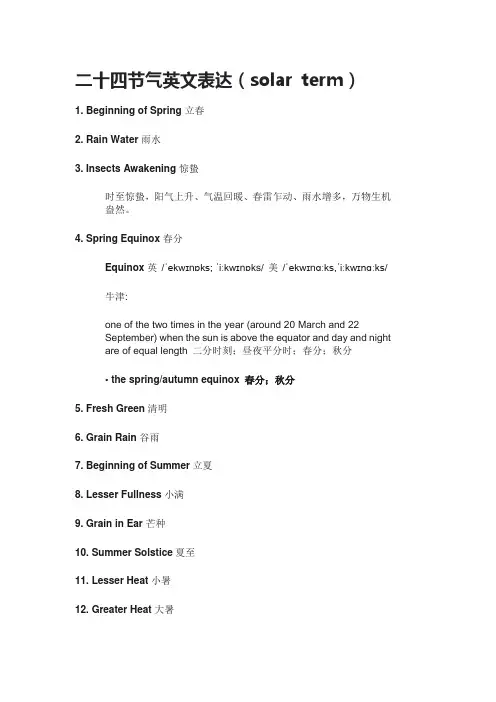
二十四节气英文表达(solar term)1. Beginning of Spring 立春2. Rain Water雨水3. Insects Awakening 惊蛰时至惊蛰,阳气上升、气温回暖、春雷乍动、雨水增多,万物生机盎然。
4. Spring Equinox 春分Equinox 英/ˈekwɪnɒks; ˈiːkwɪnɒks/ 美/ˈekwɪnɑːks,ˈiːkwɪnɑːks/牛津:one of the two times in the year (around 20 March and 22September) when the sun is above the equator and day and night are of equal length 二分时刻;昼夜平分时;春分;秋分•the spring/autumn equinox 春分;秋分5. Fresh Green清明6. Grain Rain 谷雨7. Beginning of Summer立夏8. Lesser Fullness小满9. Grain in Ear 芒种10. Summer Solstice夏至11. Lesser Heat小暑12. Greater Heat大暑13. Beginning of Autumn 立秋14. End of Heat 处暑15. White Dew白露16. Autumnal Equinox秋分17. Cold Dew寒露Dew 英/djuː/ 美/duː/ n. 珠,滴;露水;清新vt. (露水等)弄湿vi. 结露水18. First Frost 霜降19. Beginning of Winter立冬20. Light Snow小雪21. Heavy Snow大雪22. Winter Solstice冬至Solstice 英/ˈsɒlstɪs/ 美/ˈsɑːlstɪs/either of the two times of the year at which the sun reaches itshighest or lowest point in the sky at midday, marked by thelongest and shortest days 至(点);(夏或冬)至•the summer/winter solstice 夏至;冬至23. Lesser Colder小寒24. Greater Cold 大寒。
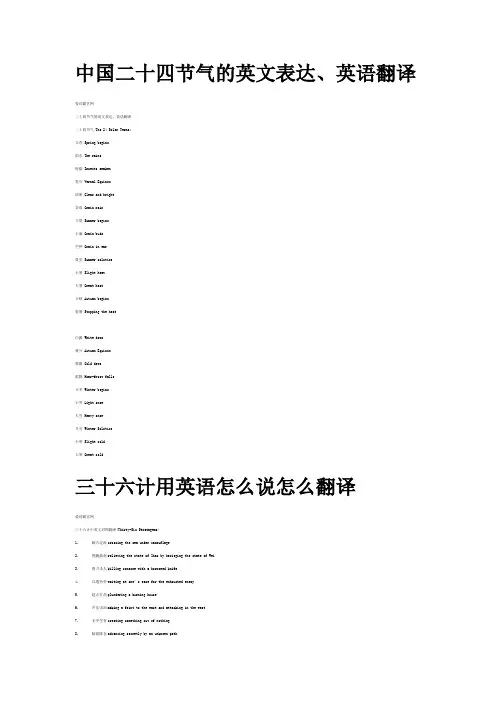
中国二十四节气的英文表达、英语翻译爱词霸官网二十四节气的英文表达、英语翻译二十四节气 The 24 Solar Terms:立春 Spring begins雨水 The rains惊蛰 Insects awaken春分 Vernal Equinox清明 Clear and bright谷雨 Grain rain立夏 Summer begins小满 Grain buds芒种 Grain in ear夏至 Summer solstice小暑 Slight heat大暑 Great heat立秋 Autumn begins处暑 Stopping the heat白露 White dews秋分 Autumn Equinox寒露 Cold dews霜降 Hoar-frost falls立冬 Winter begins小雪 Light snow大雪 Heavy snow冬至 Winter Solstice小寒 Slight cold大寒 Great cold三十六计用英语怎么说怎么翻译爱词霸官网三十六计中英文对照翻译(Thirty-Six Stratagems)1. 瞒天过海crossing the sea under camouflage2. 围魏救赵relieving the state of Zhao by besieging the state of Wei3. 借刀杀人killing someone with a borrowed knife4. 以逸待劳waiting at one’s ease for the exhausted ene my5. 趁火打劫plundering a burning house6. 声东击西making a feint to the east and attacking in the west7. 无中生有creating something out of nothing8. 暗渡陈仓advancing secretly by an unknown path9. 隔岸观火watching a fire from the other side of the river10. 笑里藏刀covering the dagger with a smile11. 李代桃僵palming off substitute for the real thing12. 顺手牵羊picking up something in passing13. 打草惊蛇beating the grass to frighten the snake14. 借尸还魂resurrecting a dead soul by borrowing a corpse15. 调虎离山luring the tiger out of his den16. 欲擒故纵letting the enemy off in order to catch him17. 抛砖引玉giving the enemy something to induce him to lose more valuable things18. 擒贼擒王capturing the ringleader first in order to capture all the followers19. 釜底抽薪extracting the firewood from under the cauldron20. 混水摸鱼muddling the water to catch the fish; fishing in troubled waters21. 金蝉脱壳slipping away by casting off a cloak; getting away like the cicada sloughing its skin22. 关门捉贼catching the thief by closing / blocking his escape route23. 远交近攻befriending the distant enemy while attacking a nearby enemy24. 假途伐虢attacking the enemy by passing through a common neighbor25. 偷梁换柱stealing the beams and pillars and replacing them with rotten timbers26. 指桑骂槐reviling/ abusing the locust tree while pointing to the mulberry27. 假痴不癫feigning madness without becoming insane28. 上屋抽梯removing the ladder after the enemy has climbed up the roof29. 树上开花putting artificial flowers on trees30. 反客为主turning from the guest into the host31. 美人计using seductive women to corrupt the enemy32. 空城计presenting a bold front to conceal unpreparedness33. 反间计sowing discord among the enemy34. 苦肉计deceiving the enemy by torturing one’s own man35. 连环计coordinating one stratagem with another36. 走为上decamping being the best; running away as the best choice。
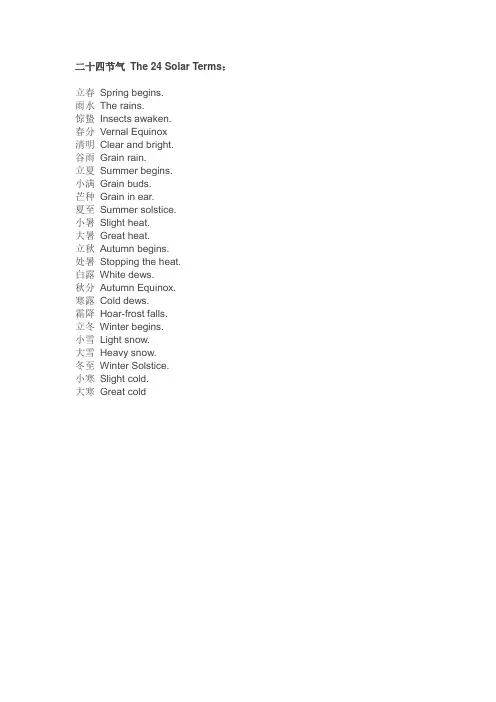
二十四节气The 24 Solar Terms:立春Spring begins.雨水The rains.惊蛰Insects awaken.春分Vernal Equinox清明Clear and bright.谷雨Grain rain.立夏Summer begins.小满Grain buds.芒种Grain in ear.夏至Summer solstice.小暑Slight heat.大暑Great heat.立秋Autumn begins.处暑Stopping the heat.白露White dews.秋分Autumn Equinox.寒露Cold dews.霜降Hoar-frost falls.立冬Winter begins.小雪Light snow.大雪Heavy snow.冬至Winter Solstice.小寒Slight cold.大寒Great cold以下无正文仅供个人用于学习、研究;不得用于商业用途。
For personal use only in study and research; not for commercial use.仅供个人用于学习、研究;不得用于商业用途。
Nur für den persönlichen für Studien, Forschung, zu kommerziellen Zwecken verwendet werden.Pour l 'étude et la recherche uniquement à des fins personnelles; pas à des fins commerciales.仅供个人用于学习、研究;不得用于商业用途。
толькодля людей, которые используются для обучения, исследований и не должны использоваться в коммерческих целях.For personal use only in study and research; not for commercial use。
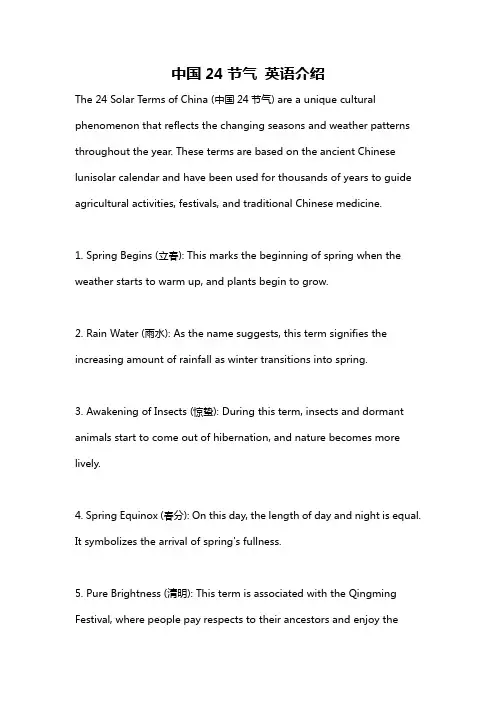
中国24节气英语介绍The 24 Solar Terms of China (中国24节气) are a unique cultural phenomenon that reflects the changing seasons and weather patterns throughout the year. These terms are based on the ancient Chinese lunisolar calendar and have been used for thousands of years to guide agricultural activities, festivals, and traditional Chinese medicine.1. Spring Begins (立春): This marks the beginning of spring when the weather starts to warm up, and plants begin to grow.2. Rain Water (雨水): As the name suggests, this term signifies the increasing amount of rainfall as winter transitions into spring.3. Awakening of Insects (惊蛰): During this term, insects and dormant animals start to come out of hibernation, and nature becomes more lively.4. Spring Equinox (春分): On this day, the length of day and night is equal. It symbolizes the arrival of spring's fullness.5. Pure Brightness (清明): This term is associated with the Qingming Festival, where people pay respects to their ancestors and enjoy theoutdoors as the weather becomes clearer and warmer.6. Grain Rain (谷雨): This term signifies the arrival of the rainy season, which is beneficial for the growth of grain crops.7. Summer Begins (立夏): As the temperature rises, summer officially begins, and crops continue to flourish.8. Grain Buds (小满): At this time, crops start to grow and form small seedlings or buds.9. Grain in Ear (芒种): This term indicates the maturity of the grain crops as they start to form ears.10. Summer Solstice (夏至): On this day, the sun reaches its highest point in the sky, making it the longest day of the year.11. Slight Heat (小暑): The hot weather gradually intensifies, and people must adapt to the rising temperatures.12. Great Heat (大暑): This term represents the hottest time of the year, and people take precautions to beat the summer heat.13. Autumn Begins (立秋): As the heat subsides, autumn begins, and people prepare for the upcoming harvest season.14. The Limit of Heat (处暑): The weather starts to cool down, and the hottest days of summer pass.15. White Dew (白露): Dewdrops become more visible as the temperature drops, and mornings become cooler with the arrival of autumn.16. Autumn Equinox (秋分): Similar to the spring equinox, the length of day and night is equal during this time. It signifies the balance between light and darkness.17. Cold Dew (寒露): The temperature drops further, and the environment becomes colder as winter approaches.18. Frost's Descent (霜降): Frost starts appearing, indicating that winter is drawing near, and it is time to protect crops.19. Winter Begins (立冬): Winter officially starts, and the weather becomes noticeably colder.20. Slight Snow (小雪): Snowfall becomes more frequent, but it is usually light and not significant.21. Great Snow (大雪): Snowfall becomes heavier, and the weather becomes colder, hinting at the approaching winter.22. Winter Solstice (冬至): This day has the shortest daylight hours of the year, marking the longest night and the arrival of winter's peak.23. Slight Cold (小寒): The coldest days of winter pass, but the weather remains chilly.24. Great Cold (大寒): The last of the 24 terms, this is the coldest time of the year, with low temperatures and cold winds blowing.The 24 Solar Terms are not only used for agriculture but also influence Chinese festivals, traditional customs, and even daily life, as they provide guidance for people to adapt to the changing seasons.。
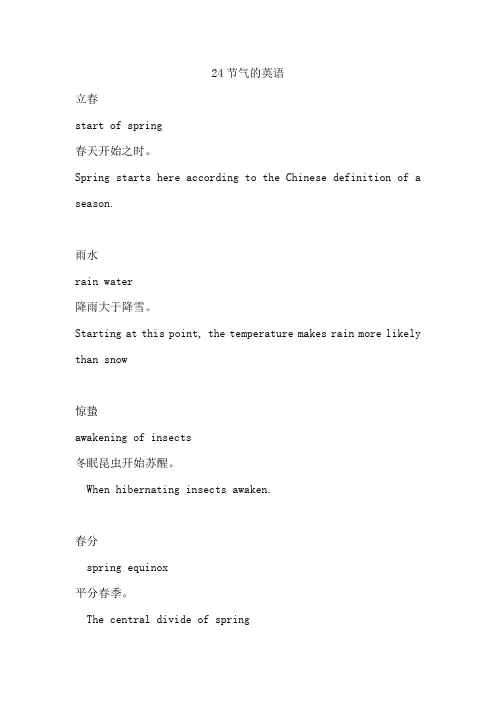
24节气的英语立春start of spring春天开始之时。
Spring starts here according to the Chinese definition of a season.雨水rain water降雨大于降雪。
Starting at this point, the temperature makes rain more likely than snow惊蛰awakening of insects冬眠昆虫开始苏醒。
When hibernating insects awaken.春分spring equinox平分春季。
The central divide of spring清明clear and bright扫墓时节。
A Chinese festival where, traditionally, ancestral graves are tended.谷雨grain rains雨水帮助谷物生长。
Rain helps grain grow.立夏start of summer夏天开始之时。
Summer starts here.小满grain full谷物变得饱满。
Grains are plump.芒种grain in ear植物的芒生长成熟。
Awns (beard of grain) grow.夏至summer solstice太阳高度达到了极值(最高)。
Summer extreme (of sun's height)小暑minor heat气温开始高到难以忍受。
When heat starts to get unbearable.大暑major heat一年最热之时。
The hottest time of the year.立秋start of autumn秋天开始之时。
Autumn starts here.处暑limit of heat炎热的夏天即将过去。
The scorching summer is going to pass by.白露white dew凝结的水汽变白。
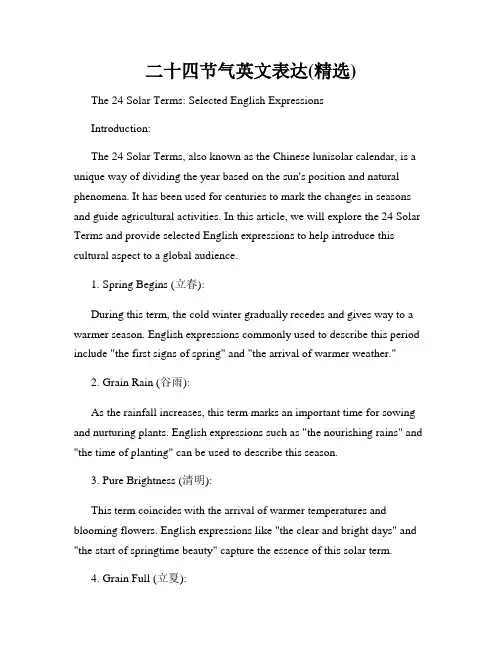
二十四节气英文表达(精选) The 24 Solar Terms: Selected English ExpressionsIntroduction:The 24 Solar Terms, also known as the Chinese lunisolar calendar, is a unique way of dividing the year based on the sun's position and natural phenomena. It has been used for centuries to mark the changes in seasons and guide agricultural activities. In this article, we will explore the 24 Solar Terms and provide selected English expressions to help introduce this cultural aspect to a global audience.1. Spring Begins (立春):During this term, the cold winter gradually recedes and gives way to a warmer season. English expressions commonly used to describe this period include "the first signs of spring" and "the arrival of warmer weather."2. Grain Rain (谷雨):As the rainfall increases, this term marks an important time for sowing and nurturing plants. English expressions such as "the nourishing rains" and "the time of planting" can be used to describe this season.3. Pure Brightness (清明):This term coincides with the arrival of warmer temperatures and blooming flowers. English expressions like "the clear and bright days" and "the start of springtime beauty" capture the essence of this solar term.4. Grain Full (立夏):With the onset of this term, the weather becomes noticeably hot, and crops begin to grow rapidly. English expressions such as "the start of summer season" and "the growing season begins" aptly describe this time.5. Grain in Ear (小满):During this term, crops show signs of maturity, and the grains start to fill. English expressions like "the crops come into ear" and "the maturing period of grains" convey the meaning of this solar term.6. Summer Begins (立夏):As temperatures rise further, this term marks the official beginning of summer. English expressions like "the arrival of scorching heat" and "the onset of summertime" can be used to depict this time of the year.7. Slight Heat (小暑):With the prolonging of hot weather, slight heat announces the hottest period of the year. English expressions such as "the commencement of dog days" and "the start of intense summer heat" capture the essence of this solar term.8. Great Heat (大暑):During this term, the weather often reaches its highest temperatures. English expressions like "the peak of summer heat" and "the hottest days of the year" aptly describe this scorching phase.9. Autumn Begins (立秋):As the summer heat wanes, this term marks the beginning of autumn, a season known for its cool breeze. English expressions such as "the onset of autumn season" and "the start of crisp weather" depict the transition between summer and autumn.10. End of Heat (处暑):With this solar term, the heat gradually subsides, and cooler temperatures set in. English expressions like "the end of the hot season" and "the beginning of a cooling period" can be used to describe this time.11. White Dew (白露):As the temperature continues to drop, dew forms on the grass in the early morning, creating a white appearance. English expressions such as "the presence of morning dew" and "the arrival of dewy mornings" reflect the essence of this solar term.12. Autumnal Equinox (秋分):During this term, the length of day and night becomes equal. English expressions like "the equilibrium of daylight and darkness" and "the balance between day and night" convey the significance of this astronomical event.13. Cold Dew (寒露):As autumn deepens, the temperature drops further, leading to the formation of cold dew. English expressions such as "the arrival of chilly mornings" and "the appearance of dew with a cold touch" capture the essence of this solar term.14. Frost's Descent (霜降):As winter approaches, the temperature drops significantly, leading to the formation of frost. English expressions like "the beginning of frosty mornings" and "the descent of winter's icy touch" depict the transition between autumn and winter.15. Winter Begins (立冬):With this term, winter officially begins, and the weather becomes noticeably colder. English expressions such as "the arrival of freezing temperatures" and "the onset of wintertime" aptly depict this season.16. Slight Snow (小雪):During this term, the first snowflakes fall, marking the arrival of snow-covered landscapes. English expressions like "the beginning of light snowfall" and "the onset of snowflakes" capture the essence of this solar term.17. Great Snow (大雪):With the onset of great snow, winter reaches its peak, resulting in significant snowfall. English expressions such as "the arrival of heavy snowfall" and "the peak period of snow accumulation" convey the meaning of this solar term.18. Winter Solstice (冬至):During this term, the daylight reaches its shortest duration, and the night is longest. English expressions like "the longest night of the year" and "the shortest day of daylight" describe this astronomical event.19. Slight Cold (小寒):After the winter solstice, the temperature drops further, creating a chilly atmosphere. English expressions such as "the onset of cold spells" and "the beginning of winter chill" depict the transition between winter solstice and spring.20. Great Cold (大寒):With the arrival of great cold, winter reaches its coldest period of the year. English expressions like "the peak period of winter's freezing cold" and "the arrival of bone-chilling temperatures" aptly describe this term.21. Spring Begins (立春):As the 24 Solar Terms cycle restarts, spring begins, symbolizing a new beginning. English expressions commonly used to describe this period include "the first signs of spring" and "the arrival of warmer weather."22. Rain Water (雨水):During this term, the weather starts to warm up, and rainfall increases. English expressions such as "the onset of rainy days" and "the arrival of spring rains" can be used to describe this season.23. Awakening of Insects (惊蛰):With the increasing temperature, insects and animals begin to come out of hibernation. English expressions like "the awakening of dormant creatures" and "the start of activity in the animal kingdom" aptly depict this time.24. Spring Equinox (春分):During this term, the length of the day and night becomes equal again. English expressions like "the equilibrium of daylight and darkness" and "the balance between day and night" convey the significance of this astronomical event.Conclusion:The 24 Solar Terms provide a unique way of understanding the changing seasons and the natural rhythm of our planet. By exploring these terms and their selected English expressions, we can bridge cultural gaps and enhance global appreciation for this fascinating aspect of Chinese tradition.。
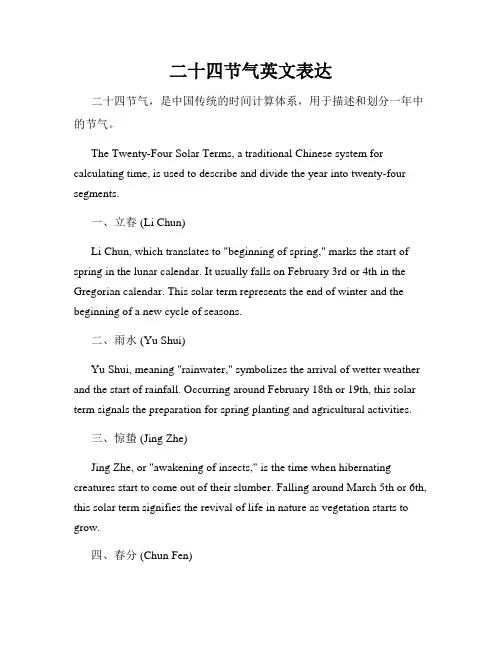
二十四节气英文表达二十四节气,是中国传统的时间计算体系,用于描述和划分一年中的节气。
The Twenty-Four Solar Terms, a traditional Chinese system for calculating time, is used to describe and divide the year into twenty-four segments.一、立春 (Li Chun)Li Chun, which translates to "beginning of spring," marks the start of spring in the lunar calendar. It usually falls on February 3rd or 4th in the Gregorian calendar. This solar term represents the end of winter and the beginning of a new cycle of seasons.二、雨水 (Yu Shui)Yu Shui, meaning "rainwater," symbolizes the arrival of wetter weather and the start of rainfall. Occurring around February 18th or 19th, this solar term signals the preparation for spring planting and agricultural activities.三、惊蛰 (Jing Zhe)Jing Zhe, or "awakening of insects," is the time when hibernating creatures start to come out of their slumber. Falling around March 5th or 6th, this solar term signifies the revival of life in nature as vegetation starts to grow.四、春分 (Chun Fen)Chun Fen, known as the "vernal equinox," occurs around March 20th or 21st. It is the midpoint between the winter solstice and the summer solstice. On this day, the length of day and night is approximately equal, symbolizing balance.五、清明 (Qing Ming)Qing Ming, often referred to as the "Tomb-Sweeping Day," falls on April 4th or 5th. It is a time for Chinese people to honor and remember their ancestors by cleaning their graves and offering sacrifices.六、谷雨 (Gu Yu)Gu Yu, meaning "grain rain," is the period when rainwater benefits the growth of crops. It usually occurs around April 19th or 20th, representing the important transition from spring to summer and the crucial time for sowing and cultivating crops.七、立夏 (Li Xia)Li Xia, the "beginning of summer," takes place around May 5th or 6th. With the rise in temperature, it officially marks the start of the hot summer season. People begin to adapt to the change in weather by adjusting their clothing and diet.八、小满 (Xiao Man)Xiao Man, known as "grain full," is the period when crops begin to mature. Falling around May 20th or 21st, this solar term signifies the critical stage in the growth of agricultural products and the forthcoming summer harvest.九、芒种 (Mang Zhong)Mang Zhong, or "grain in beard," represents the time when wheat and barley are ready to be harvested. It typically occurs around June 5th or 6th, indicating the start of summer agricultural work and the expectation of fruitful yields.十、夏至 (Xia Zhi)Xia Zhi, the "summer solstice," is the day with the longest daylight hours and the shortest night of the year. Falling around June 21st or 22nd, it marks the arrival of summer and represents the peak of heat.十一、小暑 (Xiao Shu)Xiao Shu, translated as "slight heat," is characterized by an increase in temperature. Taking place around July 7th or 8th, it signifies the hottest period of the year. People often indulge in various ways to cool down during this solar term.十二、大暑 (Da Shu)Da Shu, or "great heat," falls on July 22nd or 23rd, representing the hottest phase of summer. It is a reminder for people to take extra precautions against the extreme heat and to avoid heat-related illnesses.十三、立秋 (Li Qiu)Li Qiu, the "beginning of autumn," usually occurs around August 7th or 8th. As summer gradually wanes, this solar term marks the transition fromhot weather to cooler temperatures, with the appearance of occasional cold fronts.十四、处暑 (Chu Shu)Chu Shu, meaning "limit of heat," occurs around August 22nd or 23rd. It signifies the end of the hottest period and the start of a more bearable climate. During this solar term, people can finally enjoy some relief from the scorching summer heat.十五、白露 (Bai Lu)Bai Lu, known as "white dew," reflects the changing weather as dew starts to form in the mornings. Falling around September 7th or 8th, this solar term represents the gradual transition to autumn, with cooler temperatures and increased humidity.十六、秋分 (Qiu Fen)Qiu Fen, the "autumnal equinox," takes place around September 22nd or 23rd. Similar to Chun Fen in spring, day and night are approximately equal in length during this solar term, symbolizing harmony and balance.十七、寒露 (Han Lu)Han Lu, or "cold dew," occurs around October 8th or 9th. It is the time when the temperature further drops, leading to the formation of dew that can feel cold to the touch. This solar term signifies the arrival of cooler autumn weather.十八、霜降 (Shuang Jiang)Shuang Jiang, meaning "falling frost," falls around October 23rd or 24th. With the drop in temperatures, the first frost of the year usually appears during this period, indicating the further progression into autumn.十九、立冬 (Li Dong)Li Dong, the "beginning of winter," takes place around November 7th or 8th. As the crisp autumn air persists, this solar term signifies the arrival of colder temperatures and preparations for the upcoming winter season.二十、小雪 (Xiao Xue)Xiao Xue, translated as "light snow," falls around November 22nd or23rd. It represents the stage when the first sign of snowfall begins, albeit in the form of light flurries. This solar term marks the transition to colder weather.二十一、大雪 (Da Xue)Da Xue, or "heavy snow," typically occurs around December 7th or 8th. As winter tightens its grip, snowfall becomes heavier, covering the landscape in a thick blanket of white. This solar term symbolizes the arrival of the coldest period of the year.二十二、冬至 (Dong Zhi)Dong Zhi, the "winter solstice," is the shortest day and longest night of the year. Falling around December 21st or 22nd, it marks the official arrival of winter. People celebrate this solar term with family reunions and the consumption of traditional food.二十三、小寒 (Xiao Han)Xiao Han, meaning "light cold," falls around January 5th or 6th. As winter continues its course, the temperature drops even further. Despite the slight cold, this solar term also signifies that spring is gradually approaching.二十四、大寒 (Da Han)Da Han, or "great cold," takes place around January 20th or 21st. As the coldest period of the year, it represents the end of winter and the beginning of the next cycle of seasons. People take necessary precautions to stay warm during this extremely cold period.In conclusion, the Twenty-Four Solar Terms play a significant role in the Chinese traditional culture, observing the cyclical nature of time and the changes in weather throughout the year. These solar terms not only serve as a calendar system but also provide valuable insights into the agricultural practices and daily lives of the Chinese people.。